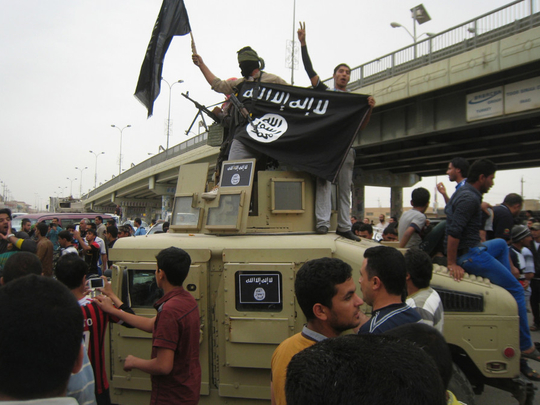
After more than a year of air strikes against Daesh (the self-proclaimed Islamic State of Iraq and the Levant), the America-led air war has scored some notable victories. The strikes have helped save Erbil, an Iraqi Kurdish city, from Daesh bombardment, aided the rescue of Yezidis from the country’s Sinjar mountains and allowed Kurdish fighters inside Syria to advance within miles of Daesh’s de-facto capital, Raqqa. Nevertheless, Daesh has remained strong in areas under its control, even expanding territory in areas such as Palmyra in Syria and Ramadi in Iraq.
The US war plan has come under criticism for its restrictive rules of engagement and comparatively few air strikes. For many, Daesh’s continued strength suggests the need for changes such as introducing US military personnel to direct air strikes and more shipments of arms to the Iraqi central government and the Kurdistan Regional Government.
But there is also a far deeper problem: The barely fettered empowerment of the militia groups leading the local fight against Daesh. These allies of convenience are often uncomfortable at best. They are challenging state authority in Iraq and in some instances have alarming links to global terrorist movements.
In Iraq, the leaders of Shiite militias fighting Daesh have links to Iran and former Iraqi prime minister Nouri Al Maliki, rather than to Haider Al Abadi, the current Premier. They have acted at cross-purposes with the government during its efforts to retake Ramadi, with openly confrontational stances towards local Sunni populations. In Iraqi Kurdistan, the Kurdish Peshmerga forces battling Daesh have focused on reclaiming areas lost to the group last year and consolidating control in disputed territory with Baghdad, suggesting continued territorial conflict once Daesh is rolled back.
In Syria, a similar dynamic is taking place. The US’s most effective partners on the ground, the Kurdish Peoples’ Protection Units (YPG), have used American air power to consolidate control over some 265 miles of territory along the border with Turkey. The YPG has been an impressive fighting force, but its utility as an offensive force may be over. The group is unwelcome in Arab majority areas, which suggests that it may now focus on protecting its front lines, rather than continuing to launch offensive operations in much of the country.
Turkey itself has agreed with the US to allow strikes against Daesh from Incirlik Air Force base, purportedly as a precursor to a large scale air assault in northern Syria. But beneath this harmony, there is discord. Viewing the toppling of Syria’s President Bashar Al Assad as a core national interest, Ankara has allied itself with a slew of militias ranging from nationalist fighters aligned with the Free Syrian Army to Salafist-inspired groups such as Ahrar Al Sham — a force that has closely cooperated with Jabhat Al Nusra, Syria’s Al Qaida affiliate. Such links rule out cooperation between Ahrar and the US, but Ahrar appears to be preparing to play a major role in policing a Daesh-free zone that Turkey wants to set up in northern Syria. Ahrar is also hostile to the US-backed YPG.
This raises the prospect of Daesh being pushed back only to be replaced with mutually antagonistic non-state actors. While the US-led coalition is likely to score further victories against Daesh, the breakdown of state control in Iraq and Syria leaves seeds for further violence. Daesh is likely to be contained and its hold over its new heartlands will slip. But, in the absence of a serious push to bolster governments acceptable to all Iraqis and Syrians, any anti-Daesh strategy of empowering warring militias runs grave risks.
— Financial Times
Aaron Stein is a non-resident fellow at the Atlantic Council.










